Japan's Official Development Assistance White Paper 2011
Chapter 2 Japan Responds to Trust
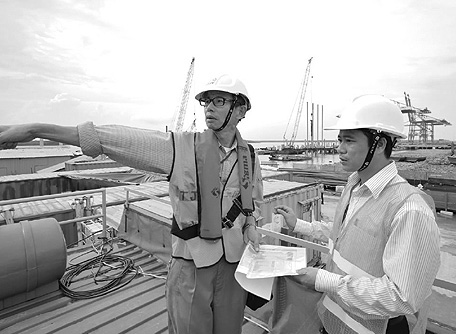
A Japanese supervisor and a Vietnamese technician check the progress of work on the "Cai Mep-Thi Vai International Port Construction Project" in Vietnam (Photo: Koji Sato/JICA)
Section 1 Faithful Execution of International Commitments
To respond to the trust shown toward Japan from countries around the world, Japan must overcome the recent earthquake, proactively and with unwavering determination fulfill its role in establishing peace and stability in the international community, and faithfully implement its international commitments.
It is the responsibility of the international community to eradicate extreme poverty and hunger, and to create a world in which everyone can live with human dignity. The Millennium Development Goals (MDGs) were established to strengthen those efforts, with concrete numerical goals and deadlines for achieving those goals. (See the figure on page 10 for details regarding MDGs.) They are the first development goals for the entire international community that the heads of state and Governments pledged to achieve. A higher level of effort is required for the international community to meet the 2015 MDGs deadline, and Japan itself is also actively contributing to such an effort. At the UN Summit on the MDGs in September 2010, Prime Minister Kan announced the "Kan Commitment" to provide $5.0 billion in assistance in the field of health and $3.5 billion in assistance in the field of education over five years beginning in 2011. Further, Japan hosted the MDGs Follow-up Meeting in Tokyo on June 2 and 3, 2011, where a variety of representatives from developing nations, civil society, and the private sector, and other related parties held lively discussions regarding genuinely effective approaches to achieve the MDGs. At the meeting, Prime Minister Kan expressed his determination to faithfully implement the international commitments Japan had made, including the "Kan Commitment."
Japan is also working proactively in the Africa region, where delays in the progress of the MDGs have been pointed out. At the 4th Tokyo International Conference on African Development (TICAD-IV) held in 2008, The Government of Japan pledged to double its annual amount of ODA to Africa -the average amount of US$0.9 billion per year during 2003-2007- to a target of US$1.8 billion by 2012. Japan's ODA for Africa was $1.75 billion in 2008 and $1.68 billion in 2009, but in 2010 it reached $2.05 billion, achieving the monetary commitment in 2010. At the Third TICAD Ministerial Follow-up Meeting in Senegal in May 2011 as well, Minister for Foreign Affairs Takeaki Matsumoto announced Japan's determination to overcome the great earthquake and continue faithfully to implement the comprehensive pledges made at TICAD IV, receiving high praise from African countries. (See the figure on page 116 for details regarding TICAD.)
Stability in Afghanistan and Pakistan is the key to anti-terror measures, and is extremely important not only to those countries and the surrounding regions, but to the peace and stability of the international community as well. In November 2009, in an effort to prevent Afghanistan from once again becoming a hotbed of terrorism, Japan determined to provide assistance up to an amount in the region of $5 billion in about five years from 2009. Since then, approximately $1.78 billion in support has been provided, on the pillars of (1) improving the ability to ensure security, (2) reintegrating former soldiers into society, and (3) development.(Note 2) The support and solidarity shown by the people and government of Afghanistan after the earthquake(Note 3) show that Japan's support has earned high praise not only in the international community, but locally as well, and that trust has been fostered.
In the case of Pakistan, in November 2009, Japan announced its intention to swiftly implement the pledge of assistance up to $1 billion in two years in April of that year at the Pakistan Donors Conference. Japan's aid has already exceeded $1 billion, including on energy, infrastructure, and other areas, as well as for assistance with the damage from fl ooding in 2010. (See page 96, 97 for details regarding Afghanistan and Pakistan.)
Since many Japanese companies operate in the ASEAN region, improvement of the trade and investment environment and enhancement of the connectivity in the region are important to boost the ASEAN economy as well as the Japanese economy. In addition, Japan hosted the first Mekong-Japan Summit Meeting in Tokyo in November 2009 and announced that it would strengthen efforts on the three pillars of (1) comprehensive development in the Mekong Region, (2) construction of a society that values human dignity, and (3) expansion of cooperation and exchange. Japan announced that it would provide ODA of more than 500 billion yen over the subsequent three years to address these issues, and is making continuous efforts.
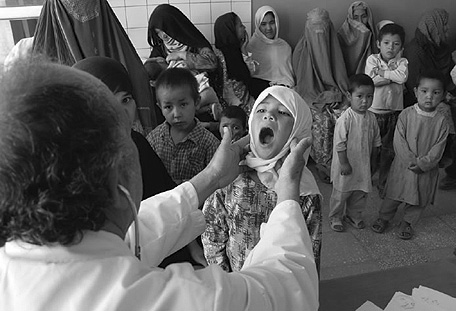
A doctor examines a girl in Afghanistan (Photo: Sayad Jan Sabawoon/JICA)
Notes:
(2) Actual aid provided from January 2009 through December 2011. Total aid provided beginning in January 2001: approximately $3.25 billion
(3) Aid and sympathy donations from Afghanistan in response to the Great East Japan Earthquake
•The governments of Afghanistan, Kandahar City, and Kabul City announced the donation of a total of approximately $1.25 million. In addition, on May 20, Ambassador Sayed M. Amin Fatimie made a courtesy call to victims that had been evacuated to Tsukuba City in Ibaraki Prefecture, and delivered gifts of household goods.
•On March 13, President Karzai and other government officials visited the Japanese embassy in Afghanistan to sign a book of condolences, and once again expressed their gratitude for support from Japan.
•Residents of Bamiyan and Chagcharan City in Ghor Province, as well as other areas, held rallies to show their support for the victims and their solidarity with Japan. The UN Human Settlements Programme (UN-HABITAT) office also received many requests to convey encouragement and condolences to Japan.
Millennium Development Goals (MDGs)
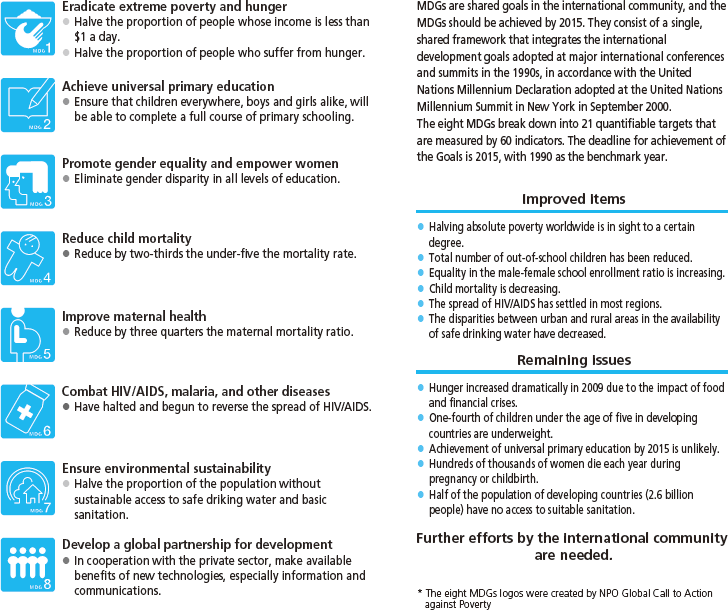
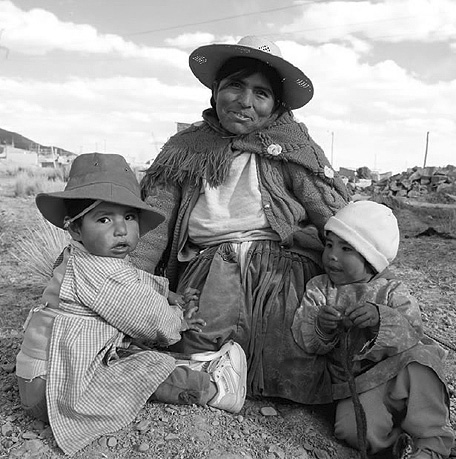
Children snuggle up to their mother in Bolivia (Photo: Shinichi Kuno/JICA)
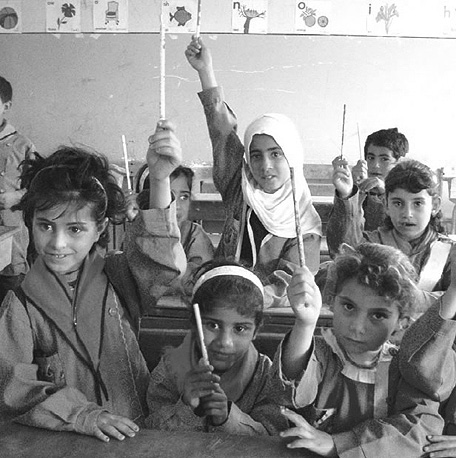
Girls attending an elementary school in rural Syria (Photo: Katsuaki Takahashi)
